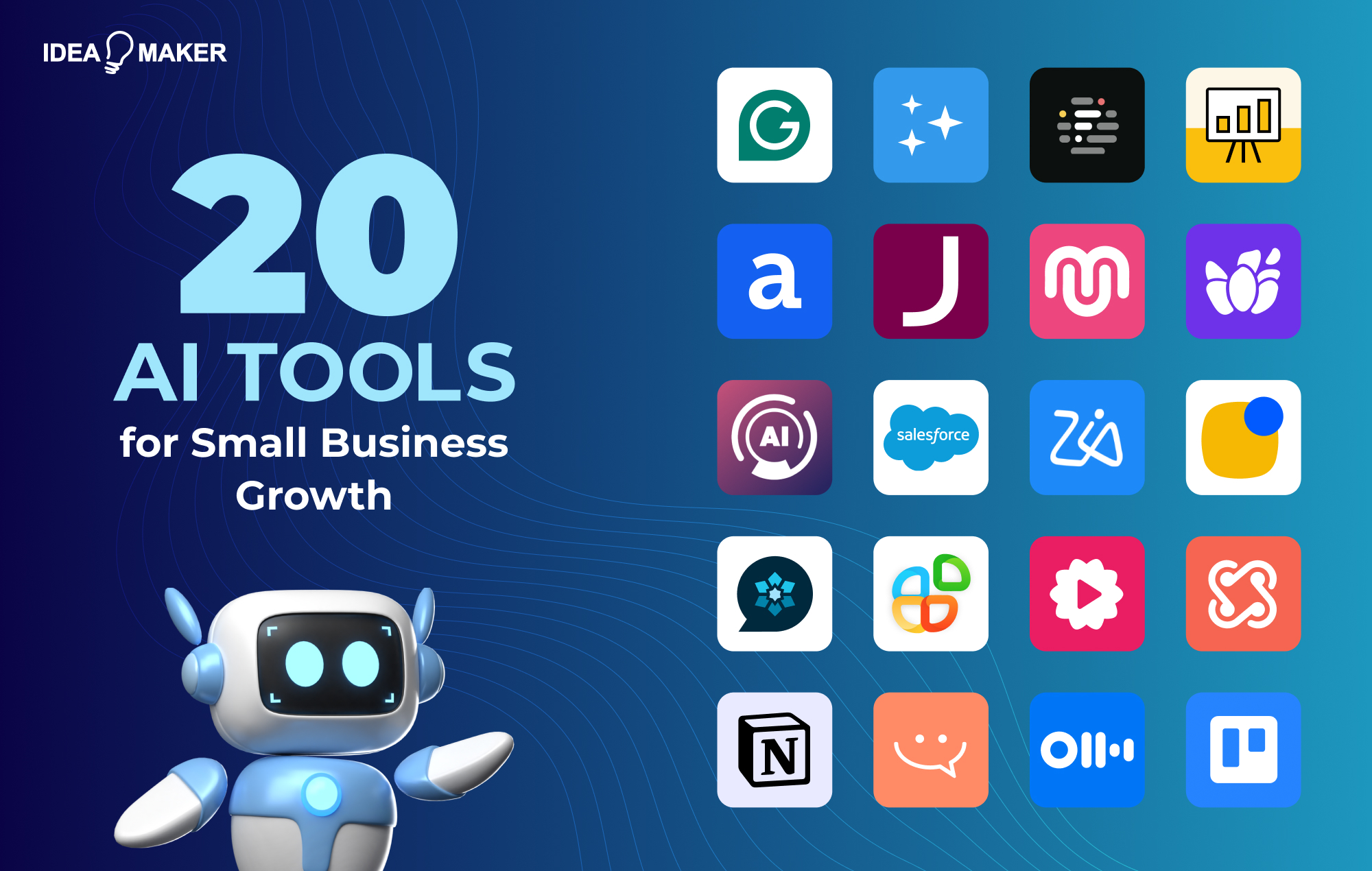The Importance of Technology in Business Growth
In today’s fast-paced business environment, technology is not just a luxury but a critical driver of both efficiency and innovation. For small businesses, embracing the right technology tools can be the difference between growing successfully and struggling to keep up with competitors. Technology fuels business growth by streamlining operations, enhancing communication, and providing actionable insights from data analytics.
One of the most significant ways technology aids business growth is by enhancing productivity. Utilizing software solutions that automate routine tasks allows businesses to shift focus toward more strategic initiatives. This capability to automate aspects of daily operations can improve not just the speed of processes but also the accuracy, leading to higher customer satisfaction and reduced overhead costs.
Moreover, technology fosters better communication and collaboration. With tools such as email, instant messaging, and video conferencing, teams can work together seamlessly, regardless of their physical location. This connectivity is essential for supporting flexible work arrangements and tapping into global talent pools.
Additionally, technology offers small businesses the potential to expand their market reach via digital marketing channels. Digital tools like Customer Relationship Management (CRM) systems and social media platforms enable businesses to connect with customers, gather meaningful feedback, and tailor marketing strategies effectively. According to a study by Forbes, leveraging digital channels has resulted in a significant boost in sales for small businesses and enhanced brand recognition.
In conclusion, adopting the right technology tools is vital for small businesses aiming to scale efficiently. As businesses continue to embrace these tools, they position themselves not just for survival but for sustaining competitive advantages and achieving long-term growth. By integrating technology into the core of their operations, small businesses can unlock new potentials and thrive in the digital age.

Key Technology Tools for Enhancing Productivity
1. Productivity Software
In today’s fast-paced business environment, productivity software plays a crucial role in enabling small businesses to maximize their potential. These tools often include word processors, spreadsheets, presentation software, and note-taking applications. By streamlining workflow processes and allowing seamless document creation and management, companies can significantly reduce time spent on mundane tasks. For example, Microsoft Office 365 or Google Workspace offer a suite of tools that are essential for everyday operations, allowing employees to communicate, collaborate, and manage tasks more efficiently. Moreover, these platforms often come with built-in cloud storage options, facilitating easy file access and sharing from any location, thus enhancing remote work capabilities.

2. Project Management Tools
Project management tools are indispensable for small businesses aiming to maintain a competitive edge. Tools like Trello, Asana, and Monday.com help teams plan, execute, and track projects, ensuring all tasks are completed on time and within budget. By providing features like task assignments, deadlines, progress tracking, and integration with other software, these tools enhance the transparency and accountability of team efforts. Additionally, they facilitate collaboration across teams and departments, making it easier to align on project goals and deliverables. Notably, a well-chosen project management tool can substantially increase productivity by minimizing downtime and streamlining workflow processes. For a deeper understanding of project management software benefits for businesses, visit Business News Daily.

3. Time Tracking Applications
Effective time management is central to improving productivity for small businesses. Time tracking applications such as Toggl, Clockify, and RescueTime empower businesses to monitor how time is spent across various tasks and projects. By providing insights into workflow patterns, these tools reveal areas where efficiency can be improved, ensuring that both managers and employees can optimize their schedules. Automatic tracking features reduce the temptation for manual input errors and provide accurate data on task execution times, essential for making informed business decisions. Furthermore, integrating time tracking apps with other business tools helps in budget estimation and billing processes, promoting more efficient use of company resources.

Adopting these crucial technology tools can greatly enhance productivity levels for small businesses, ensuring that they are not only keeping pace with industry standards but are also paving the way for sustained growth and innovation.
Essential Communication Tools for Small Businesses
Effective communication holds the key to small business success in today’s fast-paced digital landscape. Establishing seamless communication channels can significantly boost productivity and ensure clarity in collaboration. In this section, we delve into some critical communication tools that every small business should consider integrating into their operations.
1. Email Services
Emails have long been a cornerstone of professional communication, offering a reliable platform for exchanging information. For small businesses seeking robust email solutions, services like Gmail, Outlook, and Zoho Mail present excellent options due to their ease of use, integration capabilities, and robust security features. Leveraging these platforms, businesses can manage conversations efficiently, maintain records, and integrate with other tools seamlessly.
Additionally, utilizing email automation features allows businesses to save time on repetitive tasks, such as customer follow-ups, by scheduling and personalizing emails. This enhances the efficiency of internal and external communication, ensuring that all correspondences are timely and relevant.
2. Instant Messaging Services
In the era of immediacy, instant messaging services have emerged as indispensable tools for small businesses. Applications like Slack, Microsoft Teams, and WhatsApp Business facilitate real-time communication, breaking barriers of geographical constraints and promoting collaboration. These platforms enable teams to create channels for different projects, departments, or clients, ensuring that communication remains organized and purposeful.
Instant messaging tools also integrate with a multitude of software applications, allowing for streamlined workflows and real-time document sharing. As small businesses strive for agility, these services empower teams to stay connected, make quick decisions, and enhance their overall productivity.
3. Video Conferencing Solutions
With the rise of remote work and flexible arrangements, video conferencing solutions have become essential for small businesses to maintain engagement across teams and with clients. Tools such as Zoom, Google Meet, and Microsoft Teams allow for face-to-face interactions, replicating the in-person meeting experience. These platforms offer features like screen sharing, virtual backgrounds, and recording options, enhancing the overall meeting quality and experience.
Moreover, video conferencing facilitates global business engagement, allowing small businesses to connect with clients and partners worldwide without incurring significant travel costs. According to a report by Statista, the demand and usage of video conferencing tools have surged, affirming their critical role in modern business operations.
By integrating these essential communication tools, small businesses can ensure that their operations run smoothly, fostering a culture of transparency and collaboration across all levels. Such tools not only enhance productivity but also contribute to sustainable business growth.
Improving Customer Engagement with Technology
In the fast-paced world of small businesses, leveraging technology to enhance customer engagement is no longer an option but a necessity. With the right tools, businesses can nurture relationships, streamline processes, and deliver personalized experiences that foster loyalty and growth. Here’s how:
1. Customer Relationship Management (CRM) Systems
A Customer Relationship Management (CRM) system is pivotal in organizing and managing customer interactions. By centralizing all customer data, a CRM tool enables businesses to gain insights into customer preferences and behaviors. This information allows small businesses to craft tailored marketing strategies, improve customer service, and ultimately boost sales.
Well-known CRM systems like Salesforce or HubSpot offer features that automate tasks such as tracking customer interactions, setting reminders for follow-ups, and generating detailed reports. These capabilities free up time and resources that can be redirected towards nurturing more meaningful customer engagements.
2. Social Media Management Tools
Social media platforms are where many customers spend a significant part of their day, making them critical channels for engagement. However, managing multiple platforms can be overwhelming. Social media management tools like Hootsuite and Buffer simplify this process by enabling businesses to schedule posts, track engagement metrics, and respond to comments in real time.
By utilizing these tools, small business owners can maintain a consistent online presence, engage with their audience effectively, and analyze their social media strategy’s performance—all from a single dashboard. This not only improves efficiency but also enhances the overall customer experience.
3. Email Marketing Platforms
Despite the rise of social media and messaging apps, email marketing remains a powerful tool for engaging customers. Platforms such as Mailchimp and Constant Contact provide robust features that help small businesses design professional email campaigns, segment their audience, and track performance metrics.
Email marketing platforms facilitate personalization at scale by allowing businesses to send targeted messages that resonate with specific audience segments. By delivering the right message to the right audience at the right time, small businesses can nurture leads, drive conversions, and deepen customer loyalty.
Incorporating these essential technology tools can significantly enhance how small businesses engage with their customers. By streamlining processes, delivering personalized content, and maintaining consistent communication, businesses can foster stronger relationships that lead to sustained growth and success.
The Role of Cloud Solutions in Small Business
In today’s fast-paced digital landscape, cloud solutions are game-changers for small businesses looking to boost productivity and streamline operations. These innovations provide a flexible and scalable environment that is critical for growth and competitiveness. From cloud storage to collaboration tools, these technologies empower businesses to operate efficiently and cost-effectively.
Cloud Storage and File Sharing
One of the most transformative cloud solutions available to small businesses is cloud storage. By leveraging platforms like Google Drive, Dropbox, or Microsoft OneDrive, businesses can store vast amounts of data securely and access them from anywhere, at any time. This flexibility not only reduces the need for physical storage but also minimizes risks associated with data loss due to hardware failures. According to a recent study, cloud solutions also offer automatic backups and data encryption, safeguarding sensitive information.
File sharing capabilities within cloud storage platforms are equally beneficial, enhancing the ability to quickly exchange information among team members and external stakeholders. Traditional methods of file sharing, such as email, are often cumbersome and prone to error, while cloud-based sharing methods ensure that everyone has access to the most up-to-date information, reducing mistakes and improving workflow efficiency.
Collaboration Tools in the Cloud
Cloud-based collaboration tools revolutionize how small businesses manage teamwork and communication. Platforms like Slack, Microsoft Teams, and Zoom integrate seamlessly with other business applications, providing a unified environment for communication. Teams can collaborate on documents in real-time, track project progress, and host video meetings, all within the cloud ecosystem.
These tools also foster remote work, which has become increasingly prevalent. By enabling employees to work from anywhere, businesses can tap into a broader talent pool, improve employee satisfaction, and maintain productivity regardless of geographical constraints. Effective use of cloud collaboration tools can result in a more connected and engaged workforce, driving business success.
In conclusion, embracing cloud solutions is not just a beneficial option for small businesses—it’s a necessity. As technology continues to evolve, these tools will undoubtedly play a pivotal role in future-proofing operations and ensuring sustainable growth. For further insights on how cloud solutions can benefit small businesses, you might explore resources from TechRepublic.
Conclusion: Embracing Technology for Future Growth
In the rapidly evolving landscape of modern business, embracing technology is not just an option—it’s a necessity for sustainable growth and competitiveness. As we’ve explored, integrating essential technology tools such as productivity software, project management tools, and cloud solutions can significantly enhance a small business’s efficiency and productivity. By doing so, small businesses can streamline operations, reduce costs, and ultimately, maximize profitability.
Investing in communication tools like instant messaging services and video conferencing solutions can foster seamless interactions and a collaborative environment. This, in turn, nurtures team cohesion and improves customer engagement, laying a solid foundation for enduring relationships with clients and partners.
Moreover, leveraging customer relationship management (CRM) systems and social media management tools empowers businesses to engage with their customer base more effectively. By personalizing customer interactions and crafting targeted marketing campaigns, small businesses can elevate their status in the digital marketplace and reach wider audiences.
The shift to cloud-based solutions has become instrumental for businesses aiming to stay agile and adaptable. Whether it’s through cloud storage, file sharing, or collaboration tools, these technologies provide the flexibility to work from anywhere, fostering innovation and enhancing business continuity.
To secure a competitive edge, small businesses must be proactive in adopting and optimizing these technological advancements. By doing so, they can ensure robustness in their operations, positioning themselves for future growth. For more insights into the latest technological trends that can benefit your business, visit Forbes Technology for expert articles and updates.
Utilizing these essential technology tools will not only boost productivity but also empower small businesses to navigate the complexities of the digital age with confidence and agility. As the digital landscape continues to evolve, those who embrace these innovations will be best positioned to capitalize on new opportunities and achieve long-term success.


